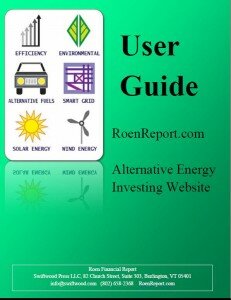User Guide: Classifying Alternative Energy Companies
Each company that the Roen Financial Report tracks is classified in two ways. First, stocks are categorized into one of three groups that indicate the size of the company, and whether it is an alternative energy “pure play.” Second, companies are organized into one or more alternative energy industry.
Company Groups
Large Cap Legacy
Large Cap Legacy stocks are banner companies that are important leaders in their fields. Though many of these are diversified companies involved in more than one business, all have one or more businesses that address our energy future. These are well-established, international companies with sales over $10 billion annually.
Small Cap Appreciation
Small Cap Appreciation companies are also key players in their field. Due to their smaller size, they are often more focused within their alternative energy sectors. As is often the case with mid- and small-size companies, these stocks have good potential for growth.
Green Investment Pure Play
Green Investment Pure Play companies are those whose sole product or service is directly focused on one area of alternative energy. These are small, more targeted investment plays in the alternative energy sector. Pure play companies are directly involved in the shift away from inefficient, outmoded, conventional energy systems and toward cleaner, safer renewable alternative energy sources.
Alternative Energy Industries
Energy Efficiency
Increasing the efficiency of energy used for heating, transportation and electricity is some of the lowest hanging fruit in the effort to reduce fossil fuel consumption and curtail pollution. Companies in this category strive to improve the efficiency of energy users both large and small while saving money at the same time. Energy efficiency businesses focus on home energy upgrades, offices buildings, factories, government programs and facilities, and the automotive industry.
Environmental
Environmental companies are involved in solving critical ecological issues affecting our planet. One of the most important is the growing concern around the procurement of potable water, as well as the treatment of wastewater. Another issue is waste reduction in its various forms—source reduction, recycling and waste-to-energy. Other areas environmental companies are involved in include pollution control and environmental remediation.
Fuel Alternatives
According to the US Department of Transportation, emissions from transportation account for 29% of total greenhouse gas emissions for the country. Alternative fuel companies are key players in increasing transportation efficiency, reducing pollution from coal-fired power plants, and lessening our dependence on foreign oil. Fuel Alternative companies are involved in electric and hybrid-electric vehicles, public transportation, biofuels, batteries, fuel cell and other power storage technologies. Alternative fuel companies also include those that provide natural gas, the least polluting of all fossil fuel choices.
Smart Grid
One of the most important ways alternative energy companies will increase the efficiency of electric production and consumption is the creation of a smart grid. The grid in use today is based on an outdated 100-year-old model that will require massive infrastructure upgrades that will take decades to complete. One example of a necessary improvement to the electric grid is to better integrate intermittent renewable generating sources such as wind and solar. In addition, a smart grid will allow utilities to better manage their peak load distribution, reducing the need to build more generating capacity. The implementation of the smart gird has started—it is not a question of “if” it will happen, but how long it will take to build.
Solar
Investments in solar cover a wide range of company types along different levels of the supply chain, using differing technologies. These range from companies producing raw materials for photovoltaics such as silicon ingots and wafers, to module manufacturers, to project developers and installers. This is a very volatile industry, so picking the right stocks at the right price in the current competitive environment is especially critical to long-term investment success.
Wind
Wind is the most financially viable renewable energy source in today’s economic environment. Though it is far from a new technology, wind power is one of the fastest growing industries in the clean energy sector. Globally, the National Academy of Sciences estimates total wind energy potential at 2,470 exajoules, roughly 40 times current worldwide consumption of electricity. Alternative energy companies involved in wind range from turbine manufacturers to component suppliers to on- and off-shore wind project developers.


